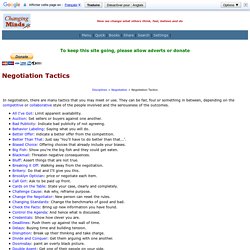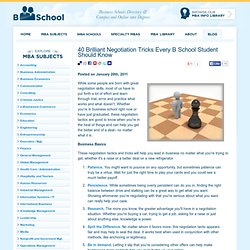

When to Make the First Offer in Negotiations. Common wisdom for negotiations says it's better to wait for your opponent to make the first offer.

In fact, you may win by making the first offer yourself. From Negotiation. by Adam D. Galinsky Whether negotiators are bidding on a firm, seeking agreement on a compensation package, or bargaining over a used car, someone has to make the first offer. The question of whether to make the opening move plagues negotiators. Because of the inherent ambiguity of most negotiations, some experts suggest that you should wait for the other side to speak first. The dramatic effect of anchors Research into human judgment has found that how we perceive a particular offer's value is highly influenced by any relevant number that enters the negotiation environment. We might expect experts to be immune to the anchoring effect.
As this research makes clear, anchors affect the judgment of even those who think they are immune to such influence. & Be able to walk away :mnmlist - StumbleUpon. In any kind of negotiation, your ability to walk away is your strongest tool.

Those who can walk away from the negotiation — legitimately walk away, not just make a show of it — are in the strongest position. Those who are convinced they need to make the deal are in the weakest position. This is true of negotiating when you’re buying a car, closing the sale of your new home, haggling in a foreign flea market, or trying to get a raise. It’s also true of anything in life. Know that there’s almost nothing you can’t walk away from. If you are convinced you need a nice house with a walk-in closet and hardwood floors and a huge kitchen, you now have a weakness.
If you are convinced that you need Stabucks grande lattes every day, or an iPhone or iPad, or an SUV or Cooper Mini or BMW … you are in the weak position, because you can’t give it up. If you know that there’s almost nothing you can’t walk away from, you can save yourself tons of money. Four Guidelines for Successful Negotiation. Let's begin with the assumption that you and your spouse do not agree about something.

It may be about how to meet an unmet need, or about a overcoming a thoughtless habit that is bothering one of you. In fact, it may be about anything that has become a conflict. Chances are that you have been responding to this issue in one of three ways: 1) ignoring your own feelings and doing it your spouse's way, 2) ignoring your spouse's feelings and doing it your way, or 3) ignoring the problem entirely. Negotiation, however, requires something very different--taking your feelings and the feelings of your spouse into account simultaneously. The following guidelines will help you achieve that very important objective: Guideline 1: Set ground rules to make negotiation pleasant and safe. Most couples view negotiation as a trip to the torture chamber. So before you begin to negotiate, set some basic ground rules to make sure that you both enjoy the experience. Guideline 3: Brainstorm with abandon. Use a Math Formula to Increase Your Edge in Negotiation.
How to Improve Your Negotiation Skills : The BridgeMaker. The most important trip you may take in life is meeting people half way. – Henry Boyle Life is a series of negotiations. As teenagers, we negotiated with our parents to borrow the family car or for an extended curfew. Today, we negotiate with our employers for better benefits; we negotiate with our spouse or partner for rights over the remote control to the television and we negotiate when we buy a car. We are always negotiating. The point is clear, often times in order to receive what we want, we first must negotiate for it. Here’s the rub though, many of us have never received any formal negotiation training. Negotiation tactics. Disciplines > Negotiation > Negotiation Tactics In negotiation, there are many tactics that you may meet or use.

They can be fair, foul or something in between, depending on the competitive or collaborative style of the people involved and the seriousness of the outcomes. All I've Got: Limit apparent availability. Auction: Set sellers or buyers against one another. 40 Brilliant Negotiation Tricks Every B School Student Should Know. 40 Brilliant Negotiation Tricks Every B School Student Should Know Posted on January 20th, 2011 While some people are born with great negotiation skills, most of us have to put forth a lot of effort and learn through trial, error and practice what works and what doesn't.

Negotiation Glossary & Terms - Karrass Negotiating Seminars. Negotiation.